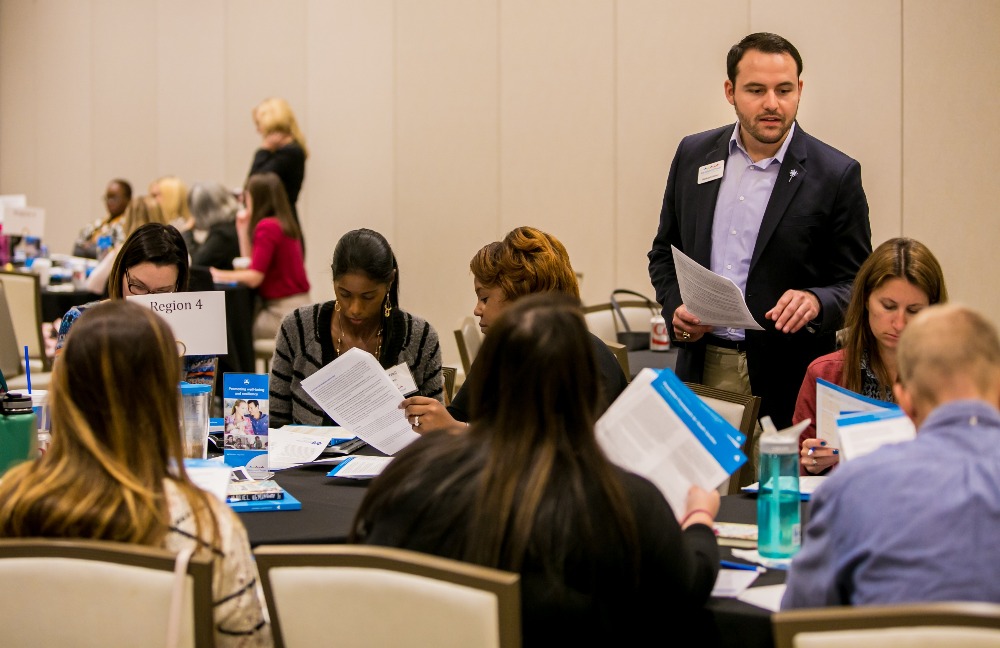Our robust training and professional development opportunities give those working with children and families the prevention know-how to keep kids safe and build strong families and communities.

Michael Shirley facilitates a discussion on expanding prevention efforts across the state in a session at the ACE Summit.
Michael Shirley fulfills training and workforce development needs with a focus on the statewide Adverse Childhood Experiences (ACE) Initiative. He leads our train-the-trainer workshops and creates professional development and peer networking opportunities. He also is a facilitator for Empower Action coalitions and assists with the biennial Building Hope for Children Conference. A certified trainer in ACEs and the protective factors, Shirley previously guided statewide awareness campaigns as communications manager.
As we head into our 2020 trainings, we asked five questions about what Children’s Trust wants to accomplish on that front this year.
In your role as community education manager, what is your focus as it relates to overseeing Children’s Trust trainings for child-serving professionals?
Our offerings include program-specific training for providers and more functional training based on the type of support we provide to community organizations like finance, communications and development. We want to help raise awareness about why prevention is so important and give professionals the tools they need to start conversations about building resilient families and communities. I manage our existing relationships with statewide partners like the Department of Social Services to ensure we provide the training that best meets their needs as an agency. I’ve got lots of ideas on how we can increase the effectiveness of our training opportunities and have spent a good bit of time making plans to implement those this year.
How do our professional development opportunities give professionals the tools they need?
Children’s Trust has staff members who are always learning and are connected to cutting-edge research around adverse childhood experiences (ACEs), building resilience and the prevention of child abuse and neglect. We are becoming more well-known for our place in this space throughout the state and around the country. We are able to offer unique training opportunities because of the level of expertise we have developed through our many connections. Our aim is to give professionals a starting point to stimulate real change in the communities in which they work, and the trainings provide professionals with a common language when discussing the complex issue of ACEs and help shift perspectives toward a more proactive approach to supporting communities. These are the first steps necessary for change, whether it’s in a particular organization or across an entire community.
How important is it to offer a diverse set of learning opportunities from statewide conferences to specialized sessions?
No one can dispute the value of learning. It’s essential for Children’s Trust to offer diverse learning opportunities to meet professionals where they are in their learning journey. Some organizations may be working on a specific project to become more trauma-informed, and an ACE training session might be what they need. Some professionals may be looking to expand their knowledge of child abuse and neglect from a broader perspective, which means a conference may meet their needs better. We want to give everyone something they can use in their work to help build resilient families and strong communities.
What elements are crucial to having a great session?
Three elements come to mind for a great session: A prepared trainer, audience participation, and clear opportunities for application. Children’s Trust works to prepare trainers to deliver content to communities around the state. We host yearly peer learning sessions to ensure trainers have the best information available and to give them the opportunity to share best practices. Though a trainer may only spend an hour or so with a group, we encourage them to spend at least double that amount of time preparing and making sure they are well-versed in the topics being presented and ready to answer any questions an audience might have.
This is a tall order for trainers, who volunteer their time outside of their normal job requirements, but it speaks to their dedication to helping communities. We work hard to design learning opportunities that are interactive and fun for audiences. These sessions can fall flat if audience participation is limited and no one shares from their own experience. Adult learning requires participants to think about their own life and how the information being shared can be useful. When audiences are in the receive-only mode, it can be hard for trainers to connect. Our audiences must come prepared to learn, remove as many distractions as possible, and take a look inside themselves for how this information will change their practices.
What’s it like to interact with people across South Carolina who are working to help children and families?
We are fortunate to have such wonderful people in our state. Their hearts for one another set South Carolina apart. Interacting with people working to help children and families through training, coalitions and other initiatives is my favorite part of the job. I love how so many in the child-serving workforce have taken their own stories of trauma and transformed that experience into a passion for serving others. Hearing stories of overcoming adversity and discovering resilience is one of the biggest benefits of my job, and it spurs me on to be a better professional so that I can provide communities with the tools they need to make positive changes. Everyone I’ve met so far wants one thing, and that’s to give children the opportunity to grow into their full potential. We’ve got a long way to go in order to create the types of safe, stable and nurturing environments for all children, but I know anything is possible when the people of our state work together toward this goal.





